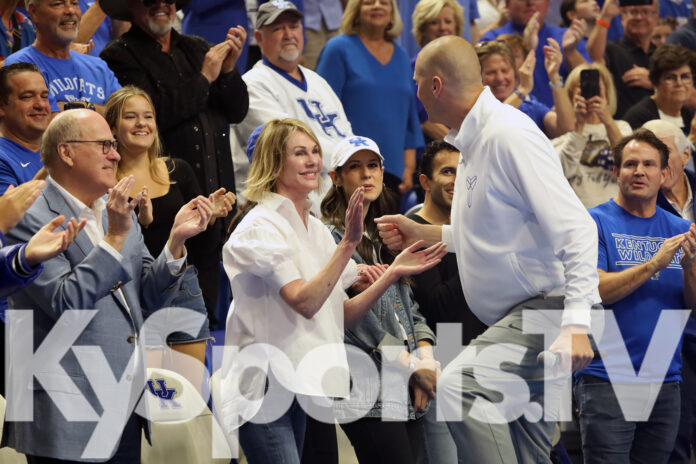Mark Pope brings a unique voice to the Kentucky basketball program that the BBN adores. Through his first seven months as head coach, it’s become clear that Pope approaches the job differently than any of his predecessors. His background alone sets him apart: three years at Columbia Medical School, a stint as a Rhodes Scholar candidate, and a fondness for discussing his graduate school English professor as his favorite college teacher.
Pope’s diverse experiences and intellectual curiosity infuse his coaching style and communication. Whether it’s analyzing the game or connecting with players, his perspective reflects a blend of basketball expertise and academic rigor. This refreshing approach has already started to define his tenure at Kentucky, offering a distinct take on one of college basketball’s most storied programs.
Mark Pope’s press conferences and media appearances provide a window into his distinctive approach to basketball. Whether it’s a postgame presser, his weekly Thursday sessions, or a conversation with Tom Leach on the radio, Pope’s thoughtful and articulate demeanor stands out.
At 52, Pope brings a cerebral perspective to the game, shaped by his unique background and experiences. He often delves into nuanced aspects of strategy, player development, and team dynamics, offering insights that go beyond the surface. His ability to articulate his vision not only engages the media and fans but also reflects how he communicates with and motivates his players.
Pope’s intellectual approach adds a refreshing layer to Kentucky basketball, showcasing a coach who balances tradition with innovation
Pope is a numbers guy. It’s obvious he loves to dig deep into the digits. Points per possession. Offensive rebound percentage. Turnover percentage. He spent nine years playing professional basketball and lists ex-NBA coach George Karl as a major influence. Pope’s a “Here’s what the number say” kind of coach. And he’s not afraid to say it. For example, when talking about Lipscomb on Tuesday, Pope said of the Bisons, “They are almost 10 percent, almost 10 percent, either 9 or 11 percent of their possessions are cuts, which is really high. Guys, you don’t see that a lot.” You don’t hear that a lot, either. Pope also sets numerical “marks,” as he calls them. He wants to average 35 3-point attempts a game. In fact, Pope was disappointed that while Kentucky made 12 3-pointers against Lipscomb, it only attempted 25. Defensively, he wants to hold the opponents to 39% shooting or below. “That’s our mark,” he said.
Pope strikes a balance between intellect and intuition, blending basketball science with the understanding that players are individuals, not robots. He made this clear last week, emphasizing that while data and strategy play a significant role, the human element remains central. Interestingly, his predecessor, John Calipari, shared a similar sentiment about players not being machines—but often used it to contextualize a tough loss. Pope, on the other hand, incorporates it as part of his broader philosophy.
What sets Pope apart is his depth of explanation. He doesn’t shy away from diving into the intricacies of his system, discussing concepts like “defensive punches,” “tagging,” “rifle game,” and “train track concepts.” These detailed, almost coaching-clinic-style insights reveal how he processes and communicates the game. While some might find this level of detail overwhelming, others—myself included—find it fascinating and a refreshing change.
Pope’s approach invites curiosity. Even if you don’t fully grasp everything he’s describing, it sparks a desire to learn more. His ability to engage on such a cerebral level makes his time at Kentucky feel like both a basketball education and a compelling new chapter in the program’s legacy.






